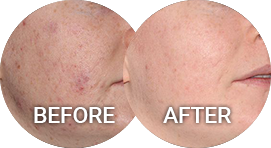Allergy Testing
Conveniently located to serve the areas of Phoenix, AZ

Allergy testing is a vital diagnostic procedure that recognizes substances (allergens) that irritate the body or cause inflammation. More than 50 million Americans struggle with nasal inflammation caused by allergies (1) and 32 million Americans have food allergies. (2) As the prevalence of many types of allergies increases, testing has become increasingly necessary to help people improve their quality of life. The goal of allergy testing is to determine the exact allergens that are causing an allergic reaction in order to develop an effective treatment plan and manage symptoms.
At Pineapple Health, we provide comprehensive testing for common environmental allergies and food allergies that can plague people’s lives. Dr. Kevin Chan, a board-certified lipidologist, and the team at Pineapple Health can help you alleviate allergy symptoms with practical testing and an in-depth knowledge of allergens and their effects.
Contact our office or call (480) 961-2366 to get started at our Phoenix location.
Do you suffer from allergies? Take our Allergy Assessment Questionnaire to get started!
Contents
- 1 About Allergies
- 2 Allergy Season in Arizona
- 3 Candidates for Allergy Testing
- 4 Personal Consultation
- 5 Allergy Testing at Pineapple Health
- 6 Allergy Treatment
- 7 Cost of Allergy Testing in Phoenix
- 8 FAQ
- 8.1 Can allergy testing help me with Arizona’s seasonal allergies?
- 8.2 How do doctors diagnose allergies?
- 8.3 Does allergy testing hurt?
- 8.4 Are allergy injections vaccines?
- 8.5 How often will I need allergy testing?
- 8.6 How old do I need to be to have an allergy test?
- 8.7 If I need allergy shots after my allergy test, how long will I need immunotherapy for?
- 9 References
About Allergies
Approximately 10-30% of people are affected by allergies globally. (3) They occur when our immune system overreacts to allergens, which are normally harmless to most people. The immune system releases histamines and other chemicals in response to these allergens, leading to a wide range of symptoms. Allergies can manifest in various forms, including seasonal allergies, food allergies, environmental allergies, and more.
If you have an allergy, or think you could have one, you might have noticed any of the following symptoms:
- Sneezing
- Congestion
- Watery Eyes
- Runny Nose
- Nasal Discomfort
- Postnasal Drip
- Sinus Pressure
- Nasal Itching
- Rash
- Skin Irritation
As we age, our bodies can develop new sensitivities, so your situation may change throughout your lifetime. During an allergic reaction, you might experience flu-like symptoms, difficulty breathing, skin irritation, inflammation, or even a serious reaction like anaphylaxis. With allergy testing, we can establish which allergens are causing your symptoms and reduce your risk of developing chronic conditions with individualized allergy therapy. When you have an allergic reaction, your body produces IgE antibodies. Allergy tests detect and measure antibody production, to help us predict and identify allergy-causing substances and materials.
Chronic Conditions and Allergy Testing
As a form of preventive care, treating your allergies can reduce inflammation in the body and your risk of developing chronic conditions such as asthma, inflammatory bowel disease, cancer, and arthritis. (4) Underlying inflammation has been linked to the development of diabetes and cardiovascular diseases. With allergy testing, you can determine the exact cause of your symptoms, manage your symptoms, and reduce the stress of chronic inflammation on your body.
Allergy Season in Arizona
The diversity of pollen and natural plant species in the Arizona desert makes allergy season especially intense. From February to June, seasonal allergies can be difficult to manage due to the high winds and blooming desert flowers that thrive in the spring and summer. Flagstaff, Arizona, a high desert city at 7,000 feet, is home to the biggest Ponderosa Pine forest in the world. In Northern Arizona, there is an abundance of plants and tree allergens including mugwort, ragweed, and sage. To the south, hot winds carry pollen and plant allergens through the air from the desert.
No matter where you live in Arizona, our specialists are prepared to help you treat allergies so you can enjoy the outdoors. Many people live in Arizona so they can enjoy nature, and we do not want you to skip your visit to the Grand Canyon or the Painted Desert because of allergies. Contact our office or call (480) 961-2366 to learn how we can help you treat your allergies and reclaim your health.
Candidates for Allergy Testing
If you are struggling with unresolved chronic health issues without an identifiable cause, you are likely a good candidate for allergy testing. If you are experiencing skin irritation, notice your nasal symptoms worsening in Arizona’s allergy season, have flu-like symptoms, or often feel unwell, allergy testing can help you identify the underlying cause of your symptoms.
Personal Consultation
To prepare for your allergy test, you will need a consultation with Pineapple Health to discuss your medical history. We will discuss your symptoms in depth as well as how your diet, environment, and daily routine may be contributing to your symptoms. During your consultation, we will discuss the best type of allergy test and your expectations for implementing lifestyle changes to manage your symptoms. If you are taking antihistamines, heartburn medication, or steroids, you will need to discontinue them before your allergy test because they can affect the accuracy of your results.
Allergy Testing at Pineapple Health
If you are experiencing allergy symptoms, there are several minimally invasive tests to quickly determine what you are allergic to. We will determine the type of allergy test you will need based on the information we gather at your consultation. Depending on your unique situation, your healthcare providers may recommend a combination of allergy tests to obtain a comprehensive understanding of your allergic sensitivities.
Blood Testing
A “finger poke” blood test is ideal for detecting delayed sensitivity to irritants. During a blood test, we will prick your finger with a small needle and use a blood sample to test for different allergies. We can identify the elements causing your symptoms and recommend a treatment plan to help you manage them. By observing the skin for any signs of allergic reactions, such as redness, swelling, or itching, we can measure your body’s response to determine the severity of the allergy. If you need more comprehensive testing, our team will draw several vials of blood for analysis.
Scratch Test
A scratch test is a localized allergy test that helps you determine which allergens you need to avoid. We use a small device to lightly scratch the skin with common allergens to test for sensitivity. If you are experiencing symptoms linked to airborne allergies, contact allergens, or food-related sensitivities, we will likely recommend a skin prick test for the best results. This is a minimally invasive test, and results only take 15-20 minutes, during which we will observe your skin for a reaction.
Allergy Treatment

Once your allergy testing is complete, we will recommend an immunotherapy treatment plan based on the results.
Allergy Shots
At Pineapple Health, we provide allergy injections to help desensitize your body to allergens and reduce your risk of developing symptoms if you are exposed to an allergen in the future. Allergy injections can improve your quality of life and increase your ability to function in environments where the allergen is unavoidable. After your allergy test, our team will discuss the best treatment option to help your body adjust to allergens commonly found in the environment.
Sublingual Immunotherapy (SLIT)
Instead of injections, SLIT involves spraying allergen extract under the tongue. The allergens are absorbed through the mucous membranes and transported to the immune system. During the initial phase of SLIT, known as the build-up phase, you gradually increase the dose of allergen extract or tablets over several days or weeks to reach a maintenance dose. Once you reach the most effective dose, you continue taking the maintenance dose as prescribed.
Benefits of Immunotherapy
There are several benefits to undergoing immunotherapy for allergies. These include:
- Symptom relief: Immunotherapy effectively reduces the severity and frequency of allergy symptoms, providing long-term relief.
- Reduction in medication reliance: Over time, immunotherapy may reduce the need for relying on allergy medications, resulting in fewer side effects and costs.
- Targeted treatment: Allergy shots or sublingual immunotherapy can be tailored to address specific allergens that trigger an individual’s allergies.
- Long-lasting results: Immunotherapy treatments can offer long-term remission from allergies, with the potential for sustained benefits even after discontinuing treatment.
- Cost-effectiveness: Compared to ongoing allergy medication expenses, the upfront cost of immunotherapy may be more cost-effective in the long run.
- Improved quality of life: By minimizing allergies’ impact on daily life, immunotherapy allows individuals to enjoy activities without discomfort.
- Reduction in the risk of anaphylaxis: For individuals with severe allergic reactions, immunotherapy can help decrease the risk of life-threatening anaphylaxis by building tolerance to the allergen over time.
Cost of Allergy Testing in Phoenix
The cost of your allergy test will depend on your symptoms and the type of allergy test you need. Insurance coverage will vary according to your plan and provider. During your initial consultation, we will discuss your options for the best results. We accept several insurance providers to reduce the cost of your treatment.
Contact our office or call (480) 961-2366 to learn more about how our office can help you manage your allergies and live a happier life.
FAQ
Can allergy testing help me with Arizona’s seasonal allergies?
Yes, allergy testing can be very helpful in identifying the specific allergens that trigger your seasonal allergies. Seasonal allergies, also known as allergic rhinitis or hay fever, are commonly triggered by outdoor allergens such as tree pollen, grasses, and weeds.
How do doctors diagnose allergies?
Diagnosing allergies often involves a comprehensive evaluation of the patient’s medical history, physical examination, and specialized diagnostic tests.
Does allergy testing hurt?
During an allergy test, you will just feel a light prick on your finger or skin so the discomfort will be minimal. If you are allergic to one of the allergens in the test, you may experience some temporary skin irritation.
Are allergy injections vaccines?
No, allergy injections are not vaccines. These injections help the body become less sensitive to allergens without causing an allergic reaction. For more information about allergy injections, please ask at your personal consultation.
How often will I need allergy testing?
We recommend having an allergy test once per year, because as we age and experience lifestyle changes our bodies change. Testing once a year is the best method for preventative care.
How old do I need to be to have an allergy test?
Allergy tests are usually the most accurate for patients over the age of 5. However, if your child is younger than 5, we can still discuss allergy testing.
If I need allergy shots after my allergy test, how long will I need immunotherapy for?
The number of allergy shots you need will depend on the type of allergy you have and your treatment plan for your symptoms. During your appointment, we will inquire about your symptoms and recommend a treatment plan that fits your needs.
References
- Birch K, Pearson-Shaver AL. Allergy Testing. PubMed. Published 2020. https://www.ncbi.nlm.nih.gov/books/NBK537020/
- Saab IN, Jones W. Trends in Food Allergy Research, Regulations and Patient Care. Nutrition Today. 2022;57(2):64-69. doi:https://doi.org/10.1097/nt.0000000000000530
- Chang KL, Guarderas JC. Allergy Testing: Common Questions and Answers. American Family Physician. 2018;98(1):34-39. Accessed April 29, 2024. https://pubmed.ncbi.nlm.nih.gov/30215951/
- Inflammation. National Institute of Environmental Health Sciences. Accessed December 29, 2023. https://www.niehs.nih.gov/health/topics/conditions/inflammation#:~:text=Cardiovascular%20diseases%2C%20such%20as%20high



